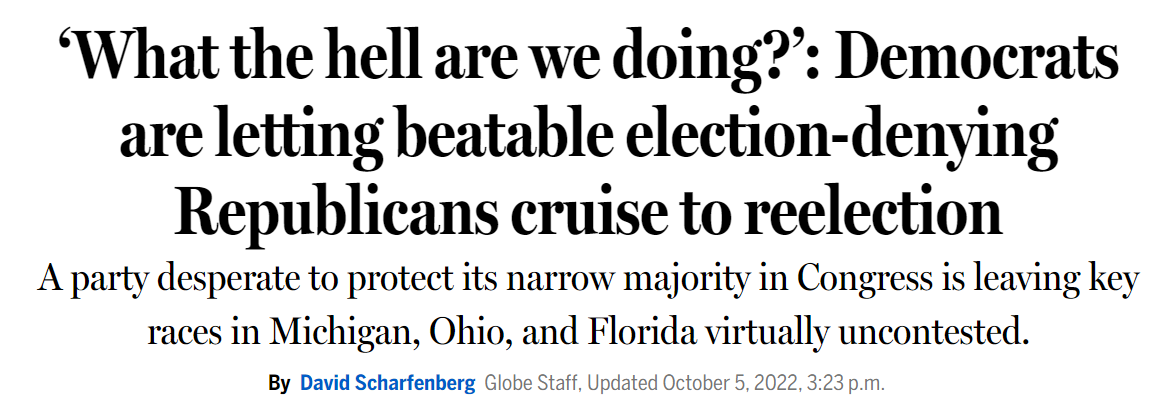Conceding Democracy: Q4 Edition
What the hell are we (still) doing?
Late last year, we covered how the Q3 campaign finance reports flashed warning signs in competitive GOP-held House seats. Now, with the campaign season in full swing, far too little has changed in the most recent public reports from Q4.
With the House majority currently decided by two votes, we simply cannot leave any seats uncontested. Republicans are retiring left and right, expanding the map of potential flip districts for Democrats and raising the stakes should we fail to win them (as more mainstream members are replaced by extremists).
WelcomePAC launched in 2021 with “Conceding Democracy”, an analysis of campaign finance data and electoral results that showed many potentially competitive Republican-held congressional seats were effectively going uncontested.
A Boston Globe headline captured the problem weeks before the midterms:
Over the course of the 2022 cycle, WelcomePAC’s quarterly Conceding Democracy reports highlighted 21 flippable red districts where Democrats were at risk of conceding races to Republicans by not fielding a credible challenge. Unfortunately, most were conceded.In 17 of the 21, no Democratic candidate passed even a low bar of $1m.
But in the four that were contested? Marie Gluesenkamp Perez flipped WA-3, Adam Frisch took Lauren Boebert to a recount in CO-03, and Will Rollins greatly overperformed against Ken Calvert in CA-41. All three districts that had $3.75m or more invested in a Democrat are now rated as toss-ups heading into 2024. Only MN-1 stayed “Safe Republican,” and that saw far less investment ($2.6m).
How Things Stand
As the contest for the House heats up, we can examine where things stand. We focus on districts between R+3 and R+8 based on PVI. These 45 districts are where “democracy deserts” most frequently appear. It’s important to keep in mind that these districts are not unwinnable: Sitting members of Congress Marcy Kaptur (R+3), Marie Glusenkamp Perez (R+5), Jared Golden (R+6), Mary Peltola (R+8) and Matt Cartwright (R+4) are all testaments to that reality.
We find that 69% of these “stretch” seats are being conceded, either because no Democrat has filed (10 districts), or because a Democrat has less than $200,000 cash on hand (21). Most worryingly, four of these districts are R+3 or R+4 districts. Contesting just two of these districts could be the difference between a House majority and a minority. In only 14 of the districts, less than a third, is there a Democrat with more than $200,000 on hand.
Nearly a third of the 45 GOP-held stretch seats are effectively uncontested (PVI between R+3 and R+8):
10 seats still have no Democratic challenger, and the time for one to emerge is quickly disappearing. These districts are:
NY-11
FL-04
NC-09
FL-21
MN-01
FL-02
FL-26
NC-07
NV-02
SC-02
4 have a candidate filed who has no cash on hand. These districts are:
FL-16
MO-02
GA-12
VA-05
Among districts R+4 or under, the following either have no challenger or have a Democrat who has raised less than $100,000. Those districts are:
WI-01
FL-15
OH-10
IA-02
These Districts Are Winnable
MO-02, where Democrats have a candidate filed but without money, was closely contested in 2020, when incumbent Ann Wagner won 52% of the vote and her Democratic challenger won 46%.
VA-05, where Democrats have a candidate but no resources, is the home of extremist House Freedom Caucus Chair Bob Good, and in 2020, Democrat Cameron Webb won 47% of the vote to Good’s 52%. Biden performed much more strongly in the district (-8) than Clinton did (-11), suggesting it is the type of district moving towards Democrats. Good has a plethora of baggage to run on: he was one of the leaders behind Kevin McCarthy’s ouster, he is an election denier and conspiracy theorist who called the coronavirus pandemic “phony,” and is a staunch opponent of gay marriage and abortion.
In Iowa’s 2nd, Social Security tinkerer Ashley Hinson faces a challenger with less than $100,000 in the bank, despite the fact that Hinson’s district was represented by a Democrat just two cycles ago in 2018, and Biden held Trump to just 51 percent of the vote in 2020.
How are Dems doing in R+3 to R+8 districts entering 2024?
No Longer Conceding
The path to a durable majority is for Democrats to stop conceding democracy. Voters in Bob Good’s district deserve the opportunity to vote against his insanity. When Democrats stop conceding good things happen. For instance, when Adam Frisch stopped conceding democracy and challenged Lauren Boebert, it forced her to run across the state to avoid his challenge. When Will Rollins challenged “safe” Republican Ken Calvert, the district went from “safe” to one of the “Top 5 House races to watch.”
That’s the power of refusing to concede democracy. You can go to WelcomePAC’s Win The Middle slate to do your part to keep up the fight.





So what's the call to action, what can I do?